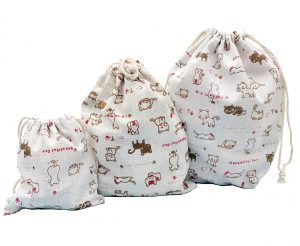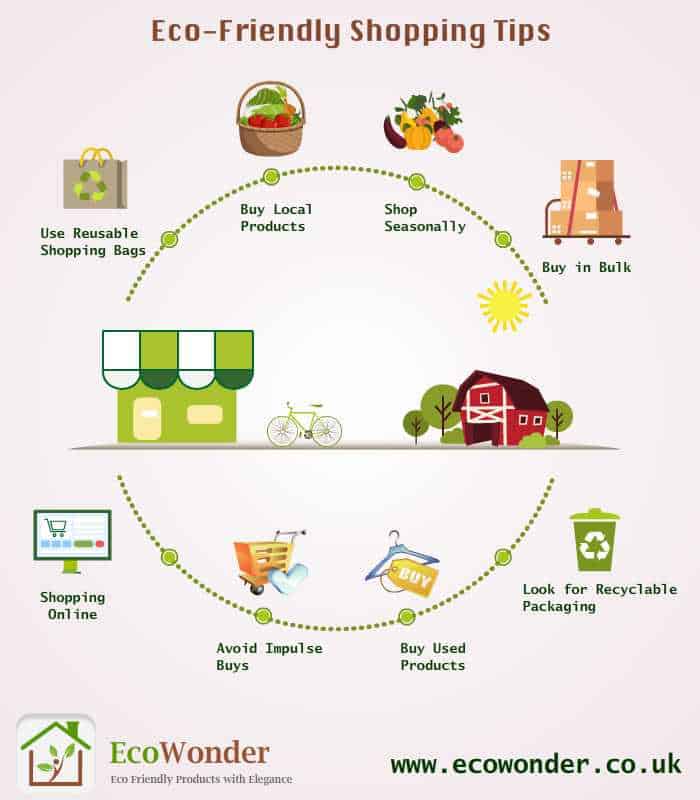Over the last decade, realization and concern towards the environment has led to the movement of consumers behaviour to minimize our carbon footprints. Although for many of us complete eco-friendly living may seems to hard, one of the most impactful and easiest change to start a greener lifestyle is with your shopping habits. Here are eight things you can do to make your next trip to the grocery store a little bit more environment friendly.
Use Reusable Shopping Bags
For eco-friendly shopping starters, using heavy-duty shopping bags is a great way to help cut back on pollution. Plastic bags are not biodegradable and many of them end up entering the food chain when animals accidentally ingest them. Hundreds of thousands of whales, dolphins, sea turtles, and other marine mammals die every year after eating discarded plastic bags they mistake for food. Choosing reusable bags saves on non-renewable petroleum resources and protects the environment. It may take a bit to get into the habit of remembering to bring along environment friendly reusable bags, but the Earth will thank you in the long run.
Buy Local Products
Whenever it’s possible, try to purchase food products that are created locally. You’ll not only support your local community, but also will sustain some of the nutrients which might be lost in the process of being picked and shipped thousands of miles. You will also reduce your carbon footprint because of the reduced cost of transporting the products. When you shop at local butchers, bakers, farm shops and green grocers, your spending will also boost the local economy and you might build some personal relationships with local entrepreneurs.
Shop Seasonally
Food in-season not only tend to be less expensive, but it also requires less packaging or storage and reduce environmental impact of growing or transportation out of season products. For example, to apply eco-friendly shopping, instead of buying asparagus and strawberries in the winter, buy something else and wait until they are in season. What’s more, seasonal foods usually taste better and if you enjoy cooking, it may be fun to challenge your culinary skills with making more seasonal dishes.
Buy in Bulk
There are plenty of environmental and financial reasons to buy in bulk. Buying in bulk usually means cost savings in terms of both product price and gas consumption. You will also travel less for your bulk shopping trips, and this will contribute to improve the environment by reducing CO2 emissions. Buying larger packages help to save on packaging waste, since individually packaged products use more plastic, which is harmful for the environment and the food chain.
Look for Recyclable Packaging
You can make your shopping experience greener by looking for products packaged in recyclable or reusable packages. Take a look at the packages and labels of the products, they usually tell a lot of important information about the products and the packages resources. In terms of reuse, environment friendly glass jars and plastic containers can be used to store buttons, craft supplies, and even leftovers. All you have to do is make a conscious effort to buy things you can work with instead of things that will simply be thrown away.
Buy Used Products
Another great way of transforming into a greener shopper is by purchasing second-hand items. You can do this online (through eBay, Craigslist, and similar sites) or by visiting local charity shops, yard sales, and flea markets. One of the major reasons why second-hand stores are doing well is because it saves money. But apart from being easy on the pocket, another benefit of purchasing used products is environment sustainability. Just as the old saying goes, one man’s trash is another man’s treasure! You’ll be surprised at what you can find and supports everyone in the community.
Avoid Impulse Buys
When shopping, the unplanned decision to purchase something that you don’t need is what is called an impulse buy. If you’re one of these impulse buyers, you could avoid potential money problems and contribute to saving the planet by following a few simple tips. Planning is a great way to ensure you’re buying the products you need and avoid irrational decisions. Don’t carrying your credit cards, doing your research before a purchase and avoid going to shopping area are all effective ways to stop impulse buying.
Shopping Online
Shopping online can eliminate car trips and associated carbon emissions and on average, it lowers energy consumption and CO2 emissions by about 30% compared to traditional retail. E-commerce needs less space and uses less energy since everything is operated through central warehouses. A MIT study suggests that online shopping customers reduce carbon footprint almost two times compare to brick-and-mortar shoppers.






